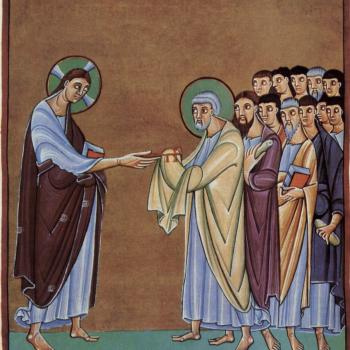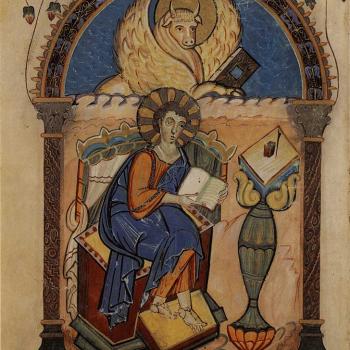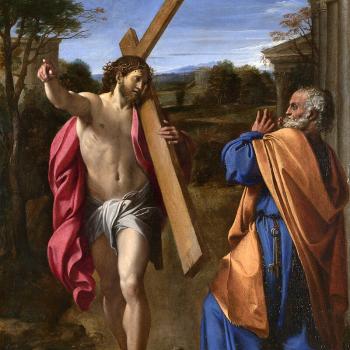
Introduction:
Although there seems to be some variation within contemporary Protestant explanations of their doctrine of Sola Scriptura (Scripture Alone), there is widespread agreement among them as to the assertion that “Sola Scriptura denies that there is any other infallible rule of faith for the church.” This claim runs directly contrary to the belief of the Catholic Church as expressed at Session IV of the Council of Trent (A.D. 1546).
A more recent Catholic explanation of the relationship between Sacred Scripture, Sacred tradition, and the teaching authority of the Catholic Church (aka Magisterium), was set forth succinctly in Pope Paul VI’s Dei Verbum. There we read in Chapter 2 that “Sacred tradition and Sacred Scripture form one sacred deposit of the word of God, committed to the Church”. The idea here of a deposit of faith being committed to the Church is reminiscent of St. Irenaeus of Lyon’s (d. ca. A.D. 200) words in his polemic against the Gnostics, namely, that “the apostles, like a rich man [depositing his money] in a bank, lodged in her [i.e. the Church’s] hands most copiously all things pertaining to the truth: so that every man, whosoever will, can draw from her the water of life.”
What function then does the Church perform in interpreting this apostolic deposit of faith, which includes the Scriptures? According to Paul VI, “the task of authentically interpreting the word of God, whether written or handed on, (8) has been entrusted exclusively to the living teaching office of the Church, (9) whose authority is exercised in the name of Jesus Christ.”
This interpretive role of the Church regarding the Scriptures contradicts the Protestant teaching on the sufficiency of Scripture. As Barry Cooper put it on a podcast for Ligonier Ministries, “The sufficiency of Scripture also means that Scripture itself is sufficient to interpret Scripture.” In a similar vein, after citing article 6 of The Thirty-nine Articles of the Anglican Church, John MacArthur suggests that “sola Scriptura simply means that Scripture is sufficient”.[1] Thus the Protestant conception of the sufficiency of Scripture is intricately linked with the doctrine of Sola Scriptura. But is there a sense in which a Catholic could agree with MacArthur in saying “that Scripture is sufficient”? The short answer is yes, but in a very qualified sense which requires a nuanced understanding of the word.
In What Sense is Scripture Sufficient?
St. Vincent of Lerins (d. ca. A.D. 445) seems to have anticipated this question in the second chapter of his Commonitory. He lived in a century where all 27 Books of the Christian New Testament would be universally recognized (there were holdouts in the East regarding the Book of Revelation up until the early part of the 5th century, for example). By this time, a number of heresies had assaulted the Church, and two Ecumenical Councils had been summoned to combat two of them. The first was the Council of Nicaea in the 4th c. to counter Arianism, and the second, the Council of Ephesus (A.D. 431), to oppose Nestorianism. When it came to the subject of the sufficiency of Scripture, Vincent had this to say:
“But here someone perhaps will ask, Since the canon of Scripture is complete, and sufficient of itself for everything, and more than sufficient, what need is there to join with it the authority of the Church’s interpretation? For this reason — because, owing to the depth of Holy Scripture, all do not accept it in one and the same sense, but one understands its words in one way, another in another; so that it seems to be capable of as many interpretations as there are interpreters…. Therefore, it is very necessary, on account of so great intricacies of such various error, that the rule for the right understanding of the prophets and apostles should be framed in accordance with the standard of Ecclesiastical and Catholic interpretation.”
This is a different kind of sufficiency than the one expressed by Cooper and MacArthur above. Additionally, Vincent is in step both with the Fathers of the Church who came before him, and with his 5th century contemporaries. Thus, in surveying the first five centuries of Christianity, Anglican scholar J.N.D. Kelly noted with respect to the relationship between Scripture and Tradition:
“Throughout the whole period Scripture and tradition ranked as complementary authorities, media different in form but coincident in content. To inquire which counted as superior or more ultimate is to pose the question in misleading and anachronistic terms. If Scripture was abundantly sufficient in principle, tradition was recognized as the surest clue to its interpretation, for in tradition the Church retained, as a legacy from the apostles which was embedded in all the organs of her institutional life, an unerring grasp of the real purport and meaning of the revelation to which Scripture and tradition alike bore witness”[2]
I contend that the view expressed by St. Vincent in particular and by Kelly’s concluding remarks with respect to Early Church Fathers in general approximates (at the very least) the Catholic notion of the material sufficiency of Scripture. This is in contrast to the principle of the formal sufficiency of Scripture, which is associated with the Reformation’s rallying cry of sola Scriptura. These terms will be unpacked and discussed in a forthcoming article.
[1] John MacArthur, “The Sufficiency of the Written Word,” in Sola Scriptura! The Protestant Position on the Bible, ed. Don Kistler (Morgan: Soli Deo Gloria Publications, 1995), 167.
[2] J.N.D. Kelly, Early Christian Doctrines (Peabody: Prince Press, 2007), 47-48.













